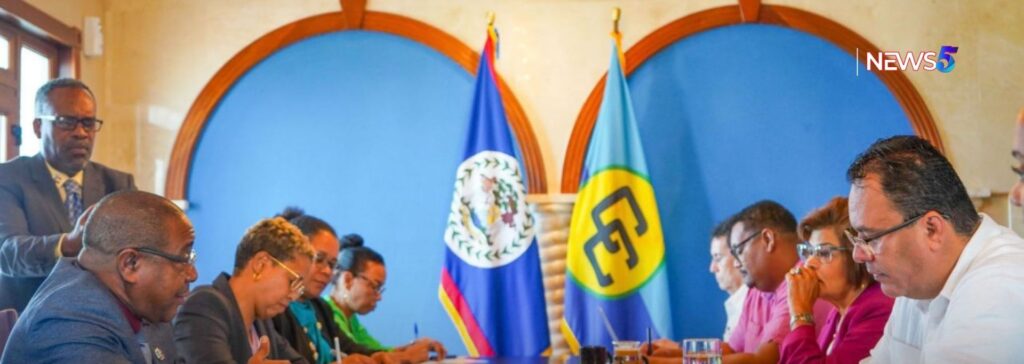
CARICOM Single Market & Economy (CSME)
The Revised Treaty of Chaguaramas establishing the Caribbean Community and the CARICOM Single Market and Economy (CSME) signed in 2001, governs trade relations in CARICOM. CSME allows the free movement of SERVICES, GOODS, PEOPLE and CAPITAL across the Member States of the Caribbean Community, by removing all barriers to trade and impediments which could restrict one’s right to provide services. The agreement facilitates the following:
- Removal of import duties, tariffs and quantitative restrictions for all goods of CARICOM origin.
- Access to land, building and other property related to the provision of services by nationals from other Member states without any limitations or discrimination.
- Travel of University Graduates, Media Workers, Sports Persons, Musicians, Artists, Managers, Supervisors and other service providers to Member States with only a travel permit, and in some cases an Inter-Caribbean Travel document. Workers in these categories can move freely to another Member State and enjoy the same benefits and rights regarding condition of work and employment and property access for either residential or business purposes.
- Equal rights of citizens of Member States to buy shares in any company of any Member State and to remove capital from one Member State to another.
- Right to transfer money form one member state to another country through bank notes, cheques, electronic transfers, etc., without having prior authorization.
- Removal of restrictions to encourage intra-regional investments.
Frequently Asked Questions About Enhanced Cooperation in Free Movement of CARICOM Nationals
Free movement of CARICOM nationals under the CARICOM Single Market and Economy (CSME) is free movement for economic purposes (whether as a business person, service provider, skilled national or as a consumer).
A CARICOM national of a CARICOM Member State participating in the CSME can exercise the rights above in another CARICOM Member State participating in the CSME. This does not include The Bahamas as that CARICOM Member State does not participate in the CSME
CARICOM nationals can move to establish a business presence in another Member State participating in the CSME. The business can be to provide goods and/or services and can be an existing business that is establishing a subsidiary, branch or agency or a new business. The CARICOM national of an existing business can also move the managerial, technical and supervisory staff of that business. The CARICOM national and the managerial, technical and supervisory staff who are CARICOM nationals have a right to indefinite stay and do not need work permits.
A CARICOM national can also move temporarily to provide a service in another Member State participating in the CSME. The CARICOM national can move with CARICOM national personnel to provide the service. The CARICOM national and the personnel have a right to stay for six months or for a longer period, if required, to complete the provision of the service and do not need work permits.
A CARICOM national that is in one of the 13 approved categories of skilled CARICOM nationals can move to seek employment in a Member State participating in the CSME and has a right to indefinite stay and does not need a work permit.
Finally, a CARICOM national can travel to another Member State temporarily a get a definite stay of 6 months without permission to work. That CARICOM national can be visiting as a tourist, looking for business or job opportunities, consuming health or other services, among other things.
The Contingent Rights Protocol provides additional rights. For further details see the Frequently Asked Question on the Protocol on Contingent Rights.
This type of free movement expands what is offered under the CSME. It is available to all CARICOM nationals of any age of the participating countries and allows those CARICOM nationals to move for any legitimate purpose including economic purposes and leisure and remain indefinitely.
Barbados, Belize, Dominica and St. Vincent and the Grenadines.
CARICOM Nationals from these four enhanced cooperation participating countries can enter, leave, re-enter, live, work without the need for a work permit or CSME skills certificate and can benefit from certain health and education services in any of the four participating countries. A participating country can refuse entry or remove a CARICOM national if that national poses a threat or is a burden on the public purse.
Barbados, Belize, Dominica and St. Vincent and the Grenadines have all decided to take advantage of the changes to the Revised Treaty to allow a group of Member States, with the agreement of the Conference of Heads of Government, to deepen their cooperation. All citizens of these countries have the right to move, reside and work (without the need for a work permit or CSME skills certificate) in any of these Member States.
Family members of CARICOM Nationals can accompany the CARICOM National of a participating country who has moved to another participating country. Family members include a spouse, unmarried children under the age of 18, unmarried children under the age of 25 attending school or university full-time and parents who are wholly dependent on the CARICOM national.
You have access to primary healthcare, primary and secondary education, national insurance benefits and other social services on the same basis as that provided to nationals of the receiving Member State.
Yes. The CARICOM Complaints Procedure adopted by the CARICOM Conference of Heads of Government can be used for any complaint arising out of an experience a CARICOM national may have had seeking to exercise his/her rights in the CSME, whether the experience(s) is at a port of entry, after entry or both. This procedure can also be used where a CARICOM national of a participating country has an experience exercising rights under enhanced cooperation in free movement. The complaints form is to be available at the ports of entry and departure and at Ministries, Agencies and Departments responsible for administering any of the regimes.
A CARICOM national wishing to make a complaint should fill out the complaints form in hard copy or online and submit it to the CSME Focal Point in the CARICOM national’s participating country, in the participating country where the CARICOM national has moved, is moving to or where the CARICOM national had the experience (if different). An investigation will be conducted.
The CARICOM Ambassador and National CSME Focal Point in each of the participating Countries:
Barbados
CARICOM Ambassador
dcomissiong@foreign.gov.bbNational CSME Focal Point
Ms. Shennel Richards Chief Research Officer (ag) Prime Minister’s Office Government Headquarters, Bay Street, St. Michael, BARBADOS Tel: 1-246-535-5613 / 1-246-535-5300 PBX Fax: 1-246-228-4386 Email: shennel.richards@pmo.gov.bbBelize
CARICOM Ambassador
H.E. Mr. Lawrence Sylvester lawrence.sylvester@mfa.gov.bzNational CSME Focal Point
Ms. Tricia Gideon Deputy Director General Directorate General for Foreign Trade Ministry of Foreign Affairs and Foreign Trade The Leigh Richardson Building, North Ring Road, City of Belmopan, Cayo, BELIZE C.A. Tel: 501-880-2832/2833 Emails: tricia.gideon@mft.gov.bz, foreigntrade@btl.net Ms. Janina Choj Trade Economist CARICOM/CSME Unit Email: Janina.Choj@mft.gov.bz, foreigntrade@btl.netDominica
CARICOM Ambassador
H.E. Dr. Gerard Jean-Jacques Emails: amboecscaricom@dominica.gov.dm, foreignaffairs@dominica.gov.dmNational CSME Focal Point
Mr. Matthan J. Walter Director of Trade Ministry of Foreign Affairs, International Business, Trade and Energy, 4th Floor, Financial Centre, Roseau, DOMINICA Tel: 1-767-266-3266 / 245-3640 Fax: 1-767-448-5200 Emails: directoroftrade@dominica.gov.dm, tradeandcommerce@dominica.gov.dmSt. Vincent and the Grenadines
CARICOM Ambassador
H.E. Mr. Allan Alexander Emails: allanhmalexander@gmail.com, ridusvg@gmail.comNational CSME Focal Point
Ms. Sylvonne Jack Economist Ministry of Foreign Affairs, Commerce and Trade Kingstown, ST. VINCENT AND THE GRENADINES Tel: 1-784-451-2253 (Direct Line) / 1-784-456-2442 (PBX) Fax: 1-784-456-2610 Email: sjack.foreignaffairs@mail.gov.vcYes. A CARICOM national can be denied entry or can be deported or removed from a participating country if an assessment is made that the CARICOM national (i) poses a genuine, present and sufficiently serious threat to public safety, public order, public morals or public health; or (ii) is likely to be, or has become, a charge on the public purse. Therefore, Belizean, Barbadian, Vincentian, and Dominican nationals moving to any participating country must be prepared to show proof of sufficient financial resources or employment prospects to demonstrate that they are unlikely to require state support.
Belize nationals traveling to Barbados, St Vincent and Dominica will be entitled to travel on a one-way ticket. However, if the traveler does not intend to reside indefinitely in those countries, he should still travel on a return ticket. Barbadians, Saint Vincentian, Dominicans traveling to Belize will still need to travel on a return ticket -- no matter how long they intend to stay in Belize.

